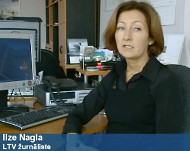7/29/2013
European Court Backs Journalist Harassed Over Speed Camera CriticismLatvian journalist believes she was harassed for exposing irregularities in speed camera procurement.

Latvian journalist Ilze Nagla is a frequent critic of speed cameras. A few days after she exposed irregularities with photo radar devices used in her country, her home was raided by state police. Earlier this month, the European Court of Human Rights ordered the Latvian government to pay her 20,000 euros (US $26,500) in compensation for violating her rights.
Nagla's prime-time Sunday television news program, "De Facto" which airs on Latvijas televizija (LTV), infuriated the Ministry of the Interior with coverage of the bungled photo enforcement procurement that became a national scandal. The government wanted details of the contract to operate 160 speed cameras to be kept secret, but Nagla revealed something shady was happening. The deal was handed to the German firm Vitronic, which would take a 35 percent cut of the tickets as opposed to an Estonian firm Alarmtec that would only have taken 25 percent.
At 9:30pm on May 11, 2010, Nagla's home was ransacked by a plain-clothes police officer who pushed his way through her door. Two other officers joined in the search of her residence, taking her laptop, hard drives, memory cards and flash drives. The public prosecutor accused her of working with someone going by the alias of "Neo" who leaked sensitive government information regarding security flaws in the State Revenue Service database. A judge granted a retroactive search warrant of Nagla's home on May 12. After the contents of all her drives were copied, they were returned on May 21.
Nagla filed a complaint with the European Court of Human Rights claiming her right of freedom of expression was violated because material was taken that identified her journalistic sources, in addition to her private, personal information. Police had already arrested "Neo" 90 minutes before the search of Nagla's home, so the information Nagla had was not essential to tracking down the suspect. An internal state police review conclude the officers did nothing wrong, but the chamber of seven judges found the action unacceptable in a July 16 ruling.
"The court considers that any search involving the seizure of data storage devices such as laptops, external hard drives, memory cards and flash drives belonging to a journalist raises a question of the journalist's freedom of expression including source protection and that the access to the information contained therein must be protected by sufficient and adequate safeguards against abuse," the judges ruled. "In the present case, although the investigating judge's involvement in an immediate post factum review was provided for in the law, the court finds that the investigating judge failed to establish that the interests of the investigation in securing evidence were sufficient to override the public interest in the protection of the journalist's freedom of expression, including source protection and protection against the handover of the research material."
A copy of the decision is available in a 400k PDF file at the source link below.


